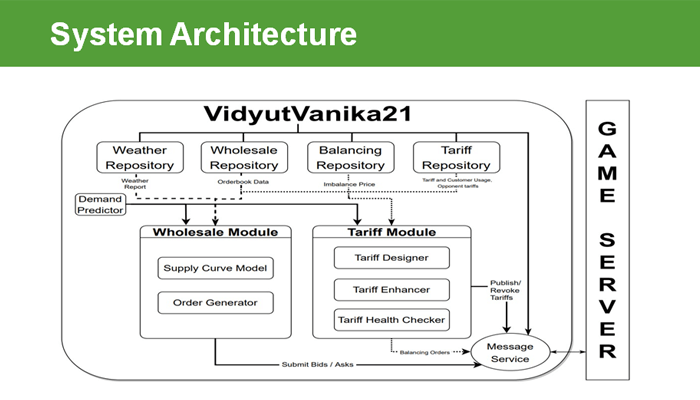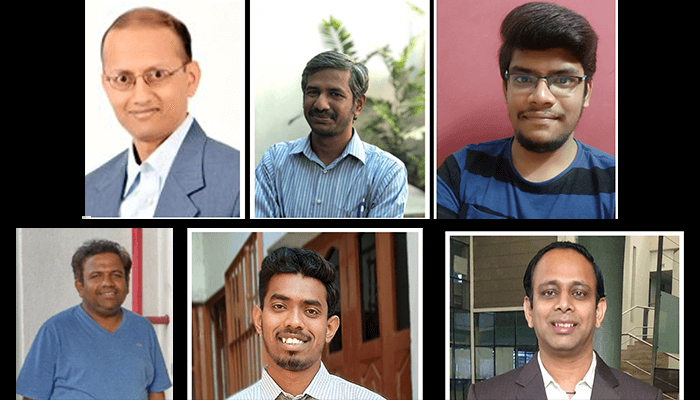A collaborative IIITH and TCS effort that strategically deploys game theory and ML techniques in a smart grid network bagged first place at the annual niche tournament, PowerTAC which simulates retail electric power markets. The team not only won by a huge margin but continues to be the only Indian presence at the event so far.
The Planning and Control Group from TCS Research and Innovation along with Machine Learning Lab (MLL) at IIITH have been collaborating since 2017 in the area of multiple autonomous agents research. When they discovered a niche competition such as the Power Trading Agent Competition (PowerTAC) simulating a smart-grid environment, it seemed to match the research problems of machine learning and game theory that they were both interested in. The core team that has participated in the competition since then has remained the same with Dr. Praveen Paruchuri and Dr. Sujit Prakash Gujar from IIITH, and Dr. Easwar Subramanian and Dr. Sanjay Bhat from TCS. This year, the joint efforts saw the inclusion of IIITH student lead Sanjay Chandlekar as well as Bala Suraj Pedasingu from TCS.
The Tournament Explained
The PowerTAC platform simulates as realistically as possible a wholesale energy market, a power distribution utility as well as energy consumers in a variety of complex scenarios affecting energy supply and demand such as climate and weather variables, non-renewable sources, governmental regulations and others. Each participating team is required to submit an automated agent or broker who can procure electricity from the generating companies, sell it to consumers through different tariffs and make virtual money in the PowerTAC environment. With normalized earnings based on profits in different categories, the team with the highest score is declared the winner. The competition runs over a period of two months in different simulated locations with various combinations of brokers where each broker is first pitted against each other, and then against 3, 5, or 7 other brokers. Based on intricate AI models, the IIITH-TCS team created a broker named VidyutVanika – Sanskrit for Power Trader – to learn how to bid in wholesale markets and offer tariffs to retailers.

The Broker: Then And Now
According to Dr. Gujar, when the group initially began participating in the tournament, their broker was not very aggressive. “We had more of a learning broker; it learned what are the good bidding strategies in the wholesale market and what are the strategies to develop tariffs with. But because the market is so complex, every game is very different, and there are so many dynamics, simply relying on ML techniques was not adequate though we could be runners-up in 2018.,” he says. This year, in addition to the learning itself, the team added game theoretic-based heuristics that helped them reduce their cost of procurement of electricity in the wholesale market. In the retail market too, improved AI techniques along with game theory-based strategies for designing the broker helped in balancing the customer base. With a great prediction model precisely calculating consumers’ needs at any point of time, VidyutVanika maintained an optimum market share too.
Sole Indian Entry
What makes VidyutVanika continue to be the sole Indian run at this global event? Both Dr. Gujar and Dr. Paruchuri unanimously attribute it to the consistent and persistent efforts afforded by the unique blend of programming and research culture prevalent in IIITH. In addition to this, Suraj credits the in-depth domain knowledge gained by the team by virtue of dedicating time to the project. “This (PowerTAC) platform is a system comprised of many subsystems and each subsystem has its own problem. The team has been analysing the platform from 2017. To supplement the knowledge gained, Sanjay Chandlekar spent nearly a year to understand the dynamics of the platform and that has played a huge role in this year’s win,” he says. As if to corroborate this, Sanjay admits that it was not only VidyutVanika’s AI and game-theoretic-based heuristic strategies but also insights gained by a deep analysis. “We analyzed hundreds of tournament log files and this helped us improve our understanding of the system which in turn explained the behaviour of these strategies. This explainability enabled us to identify possible weaknesses in our strategies, and improve them appropriately making VidyutVanika robust under all possible game situations”, he says. Dr. Subrmanian in turn ascribes the ‘human’ element to the victory. “Apart from the individual skillset that each member brought to the team, Sanjay and Suraj developed a great rapport with each other and this has definitely helped a lot,” he says. Incidentally the two youngsters had an overlapping period at TCS where they worked in tandem before Sanjay joined IIITH for an MS degree with Dr. Sujit Gujar.
More Than A Competition
As with most research groups, the tournament is just one part of the journey. “Beyond the competition itself, there is a lot more involved in terms of research or training of students,” says Dr. Paruchuri, adding that the collaboration has resulted in many research papers being published continuously. “There have been 2 Association for the Advancement of Artificial Intelligence (AAAI) papers, workshop papers and even a business conference paper,” adds Dr. Gujar. For TCS too, the academic alliance and the consequent participation in PowerTAC has been beneficial. “We have clients in the power sector, so the experiences that we gain from building a broker for PowerTAC will help feed our client engagements. Plus, we also have a machine-learning-based power platform known as the Electricity VAlue eCosystem Studio (ELVACS). It models the energy market ecosystem, much like PowerTAC, enabling power utilities to predict prosumer behaviour. So, our overall experiences through the competition will help in refining this platform,” says Dr. Subramanian. According to Dr. Bhat, the collaboration also has another side benefit. “The informal, free-wheeling exchanges that inevitably accompany PowerTAC discussions help us know the latest thinking in the academic research community,” he says.
With the cumulative wealth of experiences garnered over the period of 4 years, VidyutVanika’s victory won this year’s PowerTAC with a record-breaking normalized score and a record-breaking difference between the winner and the first runner-up. “Yes, we won the tournament this time, but there is still some ground to cover. Our next step would be to aim for consistency – either continuously win or be the runner-up for the next 4-5 years,” says Dr. Subramanian.
To know more about the AAAI papers, click here and here.

Sarita Chebbi is a compulsive early riser. Devourer of all news. Kettlebell enthusiast. Nit-picker of the written word especially when it’s not her own.


Next post